Fleurs du Mal Magazine


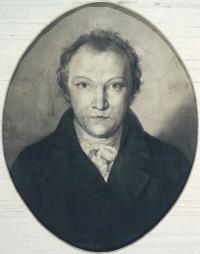
To The Muses
Whether on Ida’s shady brow,
Or in the chambers of the East,
The chambers of the sun, that now
From ancient melody have ceas’d;
Whether in Heav’n ye wander fair,
Or the green corners of the earth,
Or the blue regions of the air,
Where the melodious winds have birth;
Whether on crystal rocks ye rove,
Beneath the bosom of the sea
Wand’ring in many a coral grove,
Fair Nine, forsaking Poetry!
How have you left the ancient love
That bards of old enjoy’d in you!
The languid strings do scarcely move!
The sound is forc’d, the notes are few!
William Blake
(1757 – 1827)
To The Muses
• fleursdumal.nl magazine
More in: Archive A-B, Archive A-B, Blake, William, Tales of Mystery & Imagination
Shortlisted for the International Booker Prize 2020, an enthralling Orwellian novel about the terrors of state surveillance from one of Japan’s greatest writers.
 Finalist for the International Booker Prize and the National Book Award.
Finalist for the International Booker Prize and the National Book Award.
A haunting Orwellian novel about the terrors of state surveillance, from the acclaimed author of The Housekeeper and the Professor.
On an unnamed island, objects are disappearing: first hats, then ribbons, birds, roses. . . . Most of the inhabitants are oblivious to these changes, while those few able to recall the lost objects live in fear of the draconian Memory Police, who are committed to ensuring that what has disappeared remains forgotten.
When a young writer discovers that her editor is in danger, she concocts a plan to hide him beneath her floorboards, and together they cling to her writing as the last way of preserving the past.
A surreal, provocative fable about the power of memory and the trauma of loss, The Memory Police is a stunning new work from one of the most exciting contemporary authors writing in any language.
Yoko Ogawa has won every major Japanese literary award. Her fiction has appeared in The New Yorker, A Public Space, and Zoetrope: All-Story. Her works include The Diving Pool, a collection of three novellas; The Housekeeper and the Professor; Hotel Iris; and Revenge. She lives in Hyogo.
The Memory Police
Yoko Ogawa
Published by Pantheon
Aug 13, 2019
ISBN 9781101870600
Hardcover
$25.95
Published by Vintage
Jul 28, 2020
ISBN 9781101911815
Paperback
$16.00
# new novel
The Memory Police
by Yoko Ogawa
• fleursdumal.nl magazine
More in: - Book News, - Bookstores, Archive O-P
• Vol trots kondigt West Den Haag ‘Tote Räume’ aan, de eerste solo-expositie van Gregor Schneider in Nederland.
 Het werk van Schneider wordt gezien als baanbrekend; en zou als profetisch kunnen worden gezien, in deze tijd waarin het bewaren van afstand verplicht is. Het werk is gebaseerd op mechanismen van fysieke isolatie. De tentoonstelling toont een aaneenschakeling van kamers, beeldhouwwerken, menselijke figuren, foto’s en video’s die vier decennia van radicale kunst bijeen brengt; en is een wisselwerking met de oorspronkelijke functie van het gebouw: de Ambassade van de Verenigde Staten in Nederland van 1959 tot 2018.
Het werk van Schneider wordt gezien als baanbrekend; en zou als profetisch kunnen worden gezien, in deze tijd waarin het bewaren van afstand verplicht is. Het werk is gebaseerd op mechanismen van fysieke isolatie. De tentoonstelling toont een aaneenschakeling van kamers, beeldhouwwerken, menselijke figuren, foto’s en video’s die vier decennia van radicale kunst bijeen brengt; en is een wisselwerking met de oorspronkelijke functie van het gebouw: de Ambassade van de Verenigde Staten in Nederland van 1959 tot 2018.
Een duidelijk voorbeeld van de uitwisseling is de ‘Interrogation Room’ – een ruimte die een kopie is van een van de gevangeniscellen in het detentiekamp Guantánamo Bay, het Amerikaanse detentiecentrum in het zuidoosten van Cuba. Opgenomen in de setting van West Den Haag, overschrijdt ‘Interrogation Room’ de grenzen van de esthetica en krijgt het de status van een echte autoritaire ruimte. Waarmee de macht over de bezoekers en de potentiële schending van hun soevereiniteit wordt geschetst.
In de sequentie is ook het werk ‘Cold Storage Cell’ opgenomen; een ruimte waarmee Schneider, een politieke context schetst. Een thema dat zich, met tussenpozen, in al zijn werk herhaalt. Met de opstelling van ‘Cryo-Tank Phoenix 3’ gaat Schneiders opvatting over afgesloten ruimtes verder dan het geboden politieke kader en krijgt een metafysisch karakter. Iedere plek waar de tank verrijst, wordt getransformeerd tot een tussenzone tussen leven en dood, tussen deze wereld en de wereld die zal komen.
In de expositie is een aparte deel gewijd aan ‘Geburtshaus Goebbels’, het huis in Mönchengladbach-Rheydt waar Joseph Goebbels— de Rijksminister van Propaganda in Nazi-Duitsland — werd geboren.
In ‘Geburtshaus Goebbels’ traceert Schneider bijna letterlijk de wortels van de nazigeschiedenis en worden de fysieke fundamenten van Goebbels geboorteplaats blootgelegd —de oorsprong van zijn afkomst. Binnen het universum van Schneider is ‘Geburtshaus Goebbels’ ook een opvolger van ‘Haus u r’, het ouderlijk huis van de kunstenaar, dat op steenworp afstand van het geboortehuis van Goebbels staat.
 ‘Haus u r’ is het verlaten pand waar hij van 1985 tot 2001 werkte en onophoudelijk de innerlijke structuur reconstrueerde als een eigenzinnige typologie van viscerale kamers die in de bestaande kamers waren gebouwd (met ramen voor de ramen, muren voor de muren, etc.).
‘Haus u r’ is het verlaten pand waar hij van 1985 tot 2001 werkte en onophoudelijk de innerlijke structuur reconstrueerde als een eigenzinnige typologie van viscerale kamers die in de bestaande kamers waren gebouwd (met ramen voor de ramen, muren voor de muren, etc.).
Door het proces van zelf verslindende duplicatie – waarbij elke kamer ook de verborgen kamer is, en de ruimte – het verschil – tussen de kamers, wordt ‘Haus u r’ een ervaring van tegenstrijdigheden, waarbij aanwezigheid en afwezigheid, constructie en eliminatie, niet van elkaar gescheiden kunnen worden.
• In de context van de expositie worden enkele performances opgevoerd. En in aanvulling op het project ‘Tote Räume’ organiseert West in november van dit jaar een internationaal symposium, met de werktitel: ‘Gregor Schneider: Kunst im Kopf’.
• Gregor Schneider (Duitsland, 1969) wordt gezien als een van de meest invloedrijke kunstenaars van de afgelopen drie decennia. Sinds de jaren ‘90 heeft Schneider in toonaangevende musea over de hele wereld solotentoonstellingen gepresenteerd, waaronder, in Musée d’Art Moderne de Paris, Museum of Contemporary Art, Los Angeles, Kunstsammlung Nordrhein-Westfalen, Düsseldorf en Museo d’Arte Contemporena Roma. In 2001 won Schneider de Golden Lion op de Biënnale van Venetië, en sindsdien is zijn werk wereldwijd het onderwerp van discussies en controverses. Schneiders werk is een combinatie van architectuur, beeldhouwwerk en performance en becommentarieert de (historische) werkelijkheid.
Dit project wordt mede mogelijk gemaakt door het Ministerie van OCW, de Gemeente Den Haag, het Mondriaan Fonds en het Goethe-Institut.
Gregor Schneider
Tote Räume
Exhibition: 29.08.2020 — 06.12.2020
Opening: 29.08.2020, 19:00
Location: West Museumkwartier, vml. Amerikaanse ambassade, Lange Voorhout 102, Den Haag
West Den Haag Lange Voorhout 102, 2514 EJ Den Haag, +31(0)70.3925359, www.westdenhaag.nl
• fleursdumal.nl magazine
More in: Architecture, Archive S-T, Exhibition Archive, Galerie Deutschland, Gregor Schneider
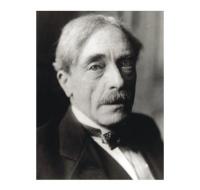
Hélène
Azur ! c’est moi… Je viens des grottes de la mort
Entendre l’onde se rompre aux degrés sonores,
Et je revois les galères dans les aurores
Ressusciter de l’ombre au fil des rames d’or.
Mes solitaires mains appellent les monarques
Dont la barbe de sel amusait mes doigts purs ;
Je pleurais. Ils chantaient leurs triomphes obscurs
Et les golfes enfuis aux poupes de leurs barques.
J’entends les conques profondes et les clairons
Militaires rythmer le vol des avirons ;
Le chant clair des rameurs enchaîne le tumulte,
Et les Dieux, à la proue héroïque exaltés
Dans leur sourire antique et que l’écume insulte,
Tendent vers moi leurs bras indulgents et sculptés.
Paul Valéry
(1871-1945)
Hélène
Poème
• fleursdumal.nl magazine
More in: Archive U-V, Archive U-V, Valéry, Paul
Chickamauga
One sunny autumn afternoon a child strayed away from its rude home in a small field and entered a forest unobserved. It was happy in a new sense of freedom from control, happy in the opportunity of exploration and adventure; for this child’s spirit, in bodies of its ancestors, had for thousands of years been trained to memorable feats of discovery and conquest—victories in battles whose critical moments were centuries, whose victors’ camps were cities of hewn stone. From the cradle of its race it had conquered its way through two continents and passing a great sea had penetrated a third, there to be born to war and dominion as a heritage.
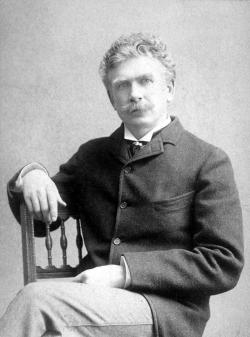 The child was a boy aged about six years, the son of a poor planter. In his younger manhood the father had been a soldier, had fought against naked savages and followed the flag of his country into the capital of a civilized race to the far South. In the peaceful life of a planter the warrior-fire survived; once kindled, it is never extinguished. The man loved military books and pictures and the boy had understood enough to make himself a wooden sword, though even the eye of his father would hardly have known it for what it was. This weapon he now bore bravely, as became the son of an heroic race, and pausing now and again in the sunny space of the forest assumed, with some exaggeration, the postures of aggression and defense that he had been taught by the engraver’s art. Made reckless by the ease with which he overcame invisible foes attempting to stay his advance, he committed the common enough military error of pushing the pursuit to a dangerous extreme, until he found himself upon the margin of a wide but shallow brook, whose rapid waters barred his direct advance against the flying foe that had crossed with illogical ease. But the intrepid victor was not to be baffled; the spirit of the race which had passed the great sea burned unconquerable in that small breast and would not be denied. Finding a place where some bowlders in the bed of the stream lay but a step or a leap apart, he made his way across and fell again upon the rear-guard of his imaginary foe, putting all to the sword.
The child was a boy aged about six years, the son of a poor planter. In his younger manhood the father had been a soldier, had fought against naked savages and followed the flag of his country into the capital of a civilized race to the far South. In the peaceful life of a planter the warrior-fire survived; once kindled, it is never extinguished. The man loved military books and pictures and the boy had understood enough to make himself a wooden sword, though even the eye of his father would hardly have known it for what it was. This weapon he now bore bravely, as became the son of an heroic race, and pausing now and again in the sunny space of the forest assumed, with some exaggeration, the postures of aggression and defense that he had been taught by the engraver’s art. Made reckless by the ease with which he overcame invisible foes attempting to stay his advance, he committed the common enough military error of pushing the pursuit to a dangerous extreme, until he found himself upon the margin of a wide but shallow brook, whose rapid waters barred his direct advance against the flying foe that had crossed with illogical ease. But the intrepid victor was not to be baffled; the spirit of the race which had passed the great sea burned unconquerable in that small breast and would not be denied. Finding a place where some bowlders in the bed of the stream lay but a step or a leap apart, he made his way across and fell again upon the rear-guard of his imaginary foe, putting all to the sword.
Now that the battle had been won, prudence required that he withdraw to his base of operations. Alas; like many a mightier conqueror, and like one, the mightiest, he could not
curb the lust for war,
Nor learn that tempted Fate will leave the loftiest star.
Advancing from the bank of the creek he suddenly found himself confronted with a new and more formidable enemy: in the path that he was following, sat, bolt upright, with ears erect and paws suspended before it, a rabbit! With a startled cry the child turned and fled, he knew not in what direction, calling with inarticulate cries for his mother, weeping, stumbling, his tender skin cruelly torn by brambles, his little heart beating hard with terror—breathless, blind with tears—lost in the forest! Then, for more than an hour, he wandered with erring feet through the tangled undergrowth, till at last, overcome by fatigue, he lay down in a narrow space between two rocks, within a few yards of the stream and still grasping his toy sword, no longer a weapon but a companion, sobbed himself to sleep. The wood birds sang merrily above his head; the squirrels, whisking their bravery of tail, ran barking from tree to tree, unconscious of the pity of it, and somewhere far away was a strange, muffed thunder, as if the partridges were drumming in celebration of nature’s victory over the son of her immemorial enslavers. And back at the little plantation, where white men and black were hastily searching the fields and hedges in alarm, a mother’s heart was breaking for her missing child.
Hours passed, and then the little sleeper rose to his feet. The chill of the evening was in his limbs, the fear of the gloom in his heart. But he had rested, and he no longer wept. With some blind instinct which impelled to action he struggled through the undergrowth about him and came to a more open ground—on his right the brook, to the left a gentle acclivity studded with infrequent trees; over all, the gathering gloom of twilight. A thin, ghostly mist rose along the water. It frightened and repelled him; instead of recrossing, in the direction whence he had come, he turned his back upon it, and went forward toward the dark inclosing wood. Suddenly he saw before him a strange moving object which he took to be some large animal—a dog, a pig—he could not name it; perhaps it was a bear. He had seen pictures of bears, but knew of nothing to their discredit and had vaguely wished to meet one. But something in form or movement of this object—something in the awkwardness of its approach—told him that it was not a bear, and curiosity was stayed by fear. He stood still and as it came slowly on gained courage every moment, for he saw that at least it had not the long menacing ears of the rabbit. Possibly his impressionable mind was half conscious of something familiar in its shambling, awkward gait. Before it had approached near enough to resolve his doubts he saw that it was followed by another and another. To right and to left were many more; the whole open space about him were alive with them—all moving toward the brook.
They were men. They crept upon their hands and knees. They used their hands only, dragging their legs. They used their knees only, their arms hanging idle at their sides. They strove to rise to their feet, but fell prone in the attempt. They did nothing naturally, and nothing alike, save only to advance foot by foot in the same direction. Singly, in pairs and in little groups, they came on through the gloom, some halting now and again while others crept slowly past them, then resuming their movement. They came by dozens and by hundreds; as far on either hand as one could see in the deepening gloom they extended and the black wood behind them appeared to be inexhaustible. The very ground seemed in motion toward the creek. Occasionally one who had paused did not again go on, but lay motionless. He was dead. Some, pausing, made strange gestures with their hands, erected their arms and lowered them again, clasped their heads; spread their palms upward, as men are sometimes seen to do in public prayer.
Not all of this did the child note; it is what would have been noted by an elder observer; he saw little but that these were men, yet crept like babes. Being men, they were not terrible, though unfamiliarly clad. He moved among them freely, going from one to another and peering into their faces with childish curiosity. All their faces were singularly white and many were streaked and gouted with red. Something in this—something too, perhaps, in their grotesque attitudes and movements—reminded him of the painted clown whom he had seen last summer in the circus, and he laughed as he watched them. But on and ever on they crept, these maimed and bleeding men, as heedless as he of the dramatic contrast between his laughter and their own ghastly gravity. To him it was a merry spectacle. He had seen his father’s negroes creep upon their hands and knees for his amusement—had ridden them so, “making believe” they were his horses. He now approached one of these crawling figures from behind and with an agile movement mounted it astride. The man sank upon his breast, recovered, flung the small boy fiercely to the ground as an unbroken colt might have done, then turned upon him a face that lacked a lower jaw—from the upper teeth to the throat was a great red gap fringed with hanging shreds of flesh and splinters of bone. The unnatural prominence of nose, the absence of chin, the fierce eyes, gave this man the appearance of a great bird of prey crimsoned in throat and breast by the blood of its quarry. The man rose to his knees, the child to his feet. The man shook his fist at the child; the child, terrified at last, ran to a tree near by, got upon the farther side of it and took a more serious view of the situation. And so the clumsy multitude dragged itself slowly and painfully along in hideous pantomime—moved forward down the slope like a swarm of great black beetles, with never a sound of going—in silence profound, absolute.
Instead of darkening, the haunted landscape began to brighten. Through the belt of trees beyond the brook shone a strange red light, the trunks and branches of the trees making a black lacework against it. It struck the creeping figures and gave them monstrous shadows, which caricatured their movements on the lit grass. It fell upon their faces, touching their whiteness with a ruddy tinge, accentuating the stains with which so many of them were freaked and maculated. It sparkled on buttons and bits of metal in their clothing. Instinctively the child turned toward the growing splendor and moved down the slope with his horrible companions; in a few moments had passed the foremost of the throng—not much of a feat, considering his advantages. He placed himself in the lead, his wooden sword still in hand, and solemnly directed the march, conforming his pace to theirs and occasionally turning as if to see that his forces did not straggle. Surely such a leader never before had such a following.
Scattered about upon the ground now slowly narrowing by the encroachment of this awful march to water, were certain articles to which, in the leader’s mind, were coupled no significant associations: an occasional blanket tightly rolled lengthwise, doubled and the ends bound together with a string; a heavy knapsack here, and there a broken rifle—such things, in short, as are found in the rear of retreating troops, the “spoor” of men flying from their hunters. Everywhere near the creek, which here had a margin of lowland, the earth was trodden into mud by the feet of men and horses. An observer of better experience in the use of his eyes would have noticed that these footprints pointed in both directions; the ground had been twice passed over—in advance and in retreat. A few hours before, these desperate, stricken men, with their more fortunate and now distant comrades, had penetrated the forest in thousands. Their successive battalions, breaking into swarms and reforming in lines, had passed the child on every side—had almost trodden on him as he slept. The rustle and murmur of their march had not awakened him. Almost within a stone’s throw of where he lay they had fought a battle; but all unheard by him were the roar of the musketry, the shock of the cannon, “the thunder of the captains and the shouting.” He had slept through it all, grasping his little wooden sword with perhaps a tighter clutch in unconscious sympathy with his martial environment, but as heedless of the grandeur of the struggle as the dead who had died to make the glory.
The fire beyond the belt of woods on the farther side of the creek, reflected to earth from the canopy of its own smoke, was now suffusing the whole landscape. It transformed the sinuous line of mist to the vapor of gold. The water gleamed with dashes of red, and red, too, were many of the stones protruding above the surface. But that was blood; the less desperately wounded had stained them in crossing. On them, too, the child now crossed with eager steps; he was going to the fire. As he stood upon the farther bank he turned about to look at the companions of his march. The advance was arriving at the creek. The stronger had already drawn themselves to the brink and plunged their faces into the flood. Three or four who lay without motion appeared to have no heads. At this the child’s eyes expanded with wonder; even his hospitable understanding could not accept a phenomenon implying such vitality as that. After slaking their thirst these men had not had the strength to back away from the water, nor to keep their heads above it. They were drowned. In rear of these, the open spaces of the forest showed the leader as many formless figures of his grim command as at first; but not nearly so many were in motion. He waved his cap for their encouragement and smilingly pointed with his weapon in the direction of the guiding light—a pillar of fire to this strange exodus.
Confident of the fidelity of his forces, he now entered the belt of woods, passed through it easily in the red illumination, climbed a fence, ran across a field, turning now and again to coquet with his responsive shadow, and so approached the blazing ruin of a dwelling. Desolation everywhere! In all the wide glare not a living thing was visible. He cared nothing for that; the spectacle pleased, and he danced with glee in imitation of the wavering flames. He ran about, collecting fuel, but every object that he found was too heavy for him to cast in from the distance to which the heat limited his approach. In despair he flung in his sword—a surrender to the superior forces of nature. His military career was at an end.
Shifting his position, his eyes fell upon some outbuildings which had an oddly familiar appearance, as if he had dreamed of them. He stood considering them with wonder, when suddenly the entire plantation, with its inclosing forest, seemed to turn as if upon a pivot. His little world swung half around; the points of the compass were reversed. He recognized the blazing building as his own home!
For a moment he stood stupefied by the power of the revelation, then ran with stumbling feet, making a half-circuit of the ruin. There, conspicuous in the light of the conflagration, lay the dead body of a woman—the white face turned upward, the hands thrown out and clutched full of grass, the clothing deranged, the long dark hair in tangles and full of clotted blood. The greater part of the forehead was torn away, and from the jagged hole the brain protruded, overflowing the temple, a frothy mass of gray, crowned with clusters of crimson bubbles—the work of a shell.
The child moved his little hands, making wild, uncertain gestures. He uttered a series of inarticulate and indescribable cries—something between the chattering of an ape and the gobbling of a turkey—a startling, soulless, unholy sound, the language of a devil. The child was a deaf mute.
Then he stood motionless, with quivering lips, looking down upon the wreck.
Ambrose Bierce
(1842-1914)
Chickamauga
• fleursdumal.nl magazine
More in: Archive A-B, Archive A-B, Bierce, Ambrose, Bierce, Ambrose
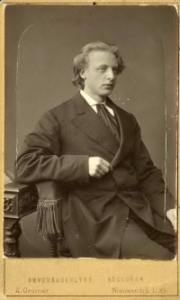
Madonna
Hoe minzaam heeft uw kozend woord geklonken
Uw zilvren woord, maar al te goed verstaan!
‘k Zag in uw oog een glimlach en een traan,
Blauw bloempje, waarin morgenparels blonken;
Gij wijst mij naar de moedermaagd, ik waan
Mij in aanbidding voor haar weggezonken…
Daar voel ik me eindeloozen vreê geschonken:
Ik zie naar haar – Mathilde, u bid ik aan:
Gij, die de moeder mijner liefde zijt,
Zijt moeder Gods, want God is mij de liefde:
U zij mijn hart, mijn vlammend hart gewijd!
Een kerk rijst allerwegen aan uw zij –
O, deernisvolle ziel, die niemand griefde,
O, mijn Madonna! bid o bid voor mij!
Jacques Perk
(1859 – 1881)
Madonna
• fleursdumal.nl magazine
More in: Archive O-P, Archive O-P, Jacques Perk
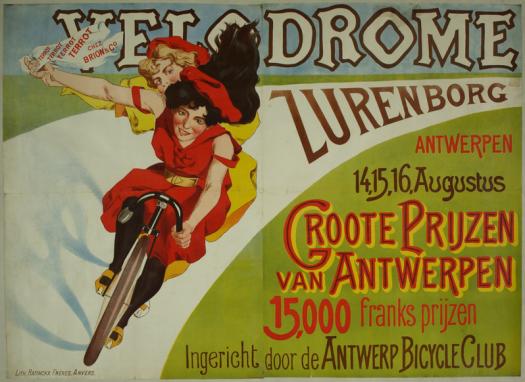
Expo Velodroom in Letterenhuis Antwerpen
Eind 19de eeuw is de fiets een ware rage. Met de expo Velodroom toont het Letterenhuis 57 fietsaffiches uit eigen collectie, die alleen al door hun formaat en kwaliteit adembenemend zijn.
Uitvindingen als de fietsketting en de luchtband maken de fiets aan het einde van de 19de eeuw tot een snel en comfortabel vervoermiddel. Op geen tien jaar tijd is de tweewieler alomtegenwoordig. Jong, oud, arm, rijk, man, vrouw. Iedereen gaat de fiets op. Fietsen is vrijheid.
Fietsmerken en organisatoren van wielerwedstrijden maken gretig gebruik van hét communicatiemiddel van die tijd: de affiche. Bekende kunstenaars worden ingeschakeld om promotie voor de fiets te maken: Henri de Toulouse-Lautrec, Alphonse Mucha en Georges Gaudy maken prachtige ontwerpen.
Behalve meesterwerkjes, zijn de affiches ook tijdsdocumenten: ze tonen de technologische en maatschappelijke veranderingen van die tijd. De hang naar vrijheid en natuur, de emancipatie van de vrouw, de opkomst van de wielersport en nieuwe vormen van vrijetijdsbesteding komen samen op deze affiches.

Met Velodroom brengt het Letterenhuis een minder bekend deel van zijn collectie naar buiten. Naast onder meer manuscripten van Vlaamse schrijvers en dichters, bewaart het Letterenhuis ook een grote verzameling culturele affiches. De collectie van het Letterenhuis telt meer dan 60.000 affiches. Een aanzienlijk deel ervan dateert van de late 19de eeuw, toen veel illustere kunstenaars ontwerpen maakten en verbeterde druktechnieken een enorme toename van de kleurrijke affiche in het straatbeeld teweegbracht.
Uitvindingen als de fietsketting en de luchtband maken de fiets aan het einde van de 19de eeuw tot een snel en comfortabel vervoermiddel. Op geen tien jaar tijd is de tweewieler alomtegenwoordig. Jong, oud, arm, rijk, man, vrouw. Iedereen gaat de fiets op. Fietsen is vrijheid.
Behalve meesterwerkjes, zijn de affiches ook tijdsdocumenten: ze tonen de technologische en maatschappelijke veranderingen van die tijd. De hang naar vrijheid en natuur, de emancipatie van de vrouw, de opkomst van de wielersport en nieuwe vormen van vrijetijdsbesteding komen samen op deze affiches.
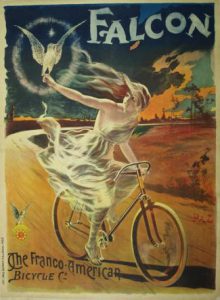 Met Velodroom brengt het Letterenhuis een minder bekend deel van zijn collectie naar buiten. Naast onder meer manuscripten van Vlaamse schrijvers en dichters, bewaart het Letterenhuis ook een grote verzameling culturele affiches. De collectie van het Letterenhuis telt meer dan 60.000 affiches. Een aanzienlijk deel ervan dateert van de late 19de eeuw, toen veel illustere kunstenaars ontwerpen maakten en verbeterde druktechnieken een enorme toename van de kleurrijke affiche in het straatbeeld teweegbracht.
Met Velodroom brengt het Letterenhuis een minder bekend deel van zijn collectie naar buiten. Naast onder meer manuscripten van Vlaamse schrijvers en dichters, bewaart het Letterenhuis ook een grote verzameling culturele affiches. De collectie van het Letterenhuis telt meer dan 60.000 affiches. Een aanzienlijk deel ervan dateert van de late 19de eeuw, toen veel illustere kunstenaars ontwerpen maakten en verbeterde druktechnieken een enorme toename van de kleurrijke affiche in het straatbeeld teweegbracht.
Geïllustreerd met prachtige affiches uit de collectie van het Letterenhuis laten tien auteurs hun licht schijnen over de poster craze & cycle hype uit die gouden tijd van la petite reine. Ze vertellen verhalen over de fietsaffiches en de ontwerpers daarvan, over de ontwikkeling van het rijwiel en de niet te overschatten maatschappelijke betekenis van die freedom machine – zeker ook voor de vrouwenemancipatie. Ook de wielersport en het ontluikende fietstoerisme komen uiteraard aan bod.
woensdag 03 juni 2020 tot zaterdag 31 oktober 2020 van 10:00 tot 17:00 voor Individuele bezoekers
Jij en je bubbel zijn meer dan welkom. Kom gerust eens uitzoeken welke vijf affiches jouw favorieten zijn. Reserveer wel even op voorhand en vergeet je mondmasker niet.
Om de verspreiding van het coronavirus te vertragen, worden enkele maatregelen genomen. Zo wordt er gewerkt met tijdsblokken en bezoekerslimieten. Daarom moet je op voorhand je ticket reserveren.
Praktisch
Om de verspreiding van het coronavirus te vertragen, worden enkele maatregelen genomen. Zo wordt er gewerkt met tijdsblokken en bezoekerslimieten. Daarom moet je op voorhand je ticket reserveren.
Openingstijden
3 juni t/m 31 oktober 2020
Woensdag – zondag 10 – 17 uur
# meer informatie op website Letterenhuis https://www.letterenhuis.be/nl
Letterenhuis
Minderbroedersstraat 22
2000 Antwerpen
tel. +32 3 222 93 20
letterenhuis@antwerpen.be
De Antwerp Museum App, een gratis app voor smartphone, gidst je door de expo. Bij de thema’s en affiches is een woordje uitleg voorzien in de app. Op die manier kan je met je smartphone de expo op je eigen tempo bezoeken. Vind de tour in de Antwerp Museum App
• fleursdumal.nl magazine
More in: AUDIO, CINEMA, RADIO & TV, Design, Exhibition Archive, Historia Belgica, Illustrators, Illustration
Das Märchen vom Ritter Blaubart
Es war einmal ein gewaltiger Rittersmann, der hatte viel Geld und Gut, und lebte auf seinem Schlosse herrlich und in Freuden. Er hatte einen blauen Bart, davon man ihn nur Ritter Blaubart nannte, obschon er eigentlich anders hieß, aber sein wahrer Name ist verloren gegangen.
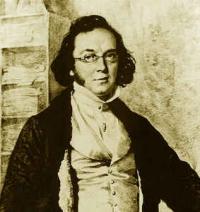 Dieser Ritter hatte sich schon mehr als einmal verheiratet, allein man hätte gehört, daß alle seine Frauen schnell nacheinander gestorben seien, ohne daß man eigentlich ihre Krankheit erfahren hatte. Nun ging Ritter Blaubart abermals auf Freiersfüßen, und da war eine Edeldame in seiner Nachbarschaft, die hatte zwei schöne Töchter und einige ritterliche Söhne, und diese Geschwister liebten einander sehr zärtlich. Als nun Ritter Blaubart die eine dieser Töchter heiraten wollte, hatte keine von beiden rechte Lust, denn sie fürchteten sich vor des Ritters blauem Bart, und mochten sich auch nicht gern voneinander trennen. Aber der Ritter lud die Mutter, die Töchter und die Brüder samt und sonders auf sein großes schönes Schloß zu Gaste, und verschaffte ihnen dort so viel angenehmen Zeitvertreib und so viel Vergnügen durch Jagden, Tafeln, Tänze, Spiele und sonstige Freudenfeste, daß sich endlich die jüngste der Schwestern ein Herz faßte, und sich entschloß, Ritter Blaubarts Frau zu werden. Bald darauf wurde auch die Hochzeit mit vieler Pracht gefeiert.
Dieser Ritter hatte sich schon mehr als einmal verheiratet, allein man hätte gehört, daß alle seine Frauen schnell nacheinander gestorben seien, ohne daß man eigentlich ihre Krankheit erfahren hatte. Nun ging Ritter Blaubart abermals auf Freiersfüßen, und da war eine Edeldame in seiner Nachbarschaft, die hatte zwei schöne Töchter und einige ritterliche Söhne, und diese Geschwister liebten einander sehr zärtlich. Als nun Ritter Blaubart die eine dieser Töchter heiraten wollte, hatte keine von beiden rechte Lust, denn sie fürchteten sich vor des Ritters blauem Bart, und mochten sich auch nicht gern voneinander trennen. Aber der Ritter lud die Mutter, die Töchter und die Brüder samt und sonders auf sein großes schönes Schloß zu Gaste, und verschaffte ihnen dort so viel angenehmen Zeitvertreib und so viel Vergnügen durch Jagden, Tafeln, Tänze, Spiele und sonstige Freudenfeste, daß sich endlich die jüngste der Schwestern ein Herz faßte, und sich entschloß, Ritter Blaubarts Frau zu werden. Bald darauf wurde auch die Hochzeit mit vieler Pracht gefeiert.
Nach einer Zeit sagte der Ritter Blaubart zu seiner jungen Frau: »Ich muß verreisen, und übergebe dir die Obhut über das ganze Schloß, Haus und Hof, mit allem, was dazu gehört. Hier sind auch die Schlüssel zu allen Zimmern und Gemächern, in alle diese kannst du zu jeder Zeit eintreten. Aber dieser kleine goldne Schlüssel schließt das hinterste Kabinett am Ende der großen Zimmerreihe. In dieses, meine Teure, muß ich dir verbieten zu gehen, so lieb dir meine Liebe und dein Leben ist. Würdest du dieses Kabinett öffnen, so erwartet dich die schrecklichste Strafe der Neugier. Ich müßte dir dann mit eigner Hand das Haupt vom Rumpfe trennen!« – Die Frau wollte auf diese Rede den kleinen goldnen Schlüssel nicht annehmen, indes mußte sie dies tun, um ihn sicher aufzubewahren, und so schied sie von ihrem Mann mit dem Versprechen, daß es ihr nie einfallen werde, jenes Kabinett aufzuschließen und es zu betreten.
Als der Ritter fort war, erhielt die junge Frau Besuch von ihrer Schwester und ihren Brüdern, die gerne auf die Jagd gingen; und nun wurden mit Lust alle Tage die Herrlichkeiten in den vielen vielen Zimmern des Schlosses durchmustert, und so kamen die Schwestern auch endlich an das Kabinett. Die Frau wollte, obschon sie selbst große Neugierde trug, durchaus nicht öffnen, aber die Schwester lachte ob ihrer Bedenklichkeit, und meinte, daß Ritter Blaubart darin doch nur aus Eigensinn das Kostbarste und Wertvollste von seinen Schätzen verborgen halte. Und so wurde der Schlüssel mit einigem Zagen in das Schloß gesteckt, und da flog auch gleich mit dumpfem Geräusch die Türe auf, und in dem sparsam erhellten Zimmer zeigten sich – ein entsetzlicher Anblick! – die blutigen Häupter aller früheren Frauen Ritter Blaubarts, die ebensowenig, wie die jetzige, dem Drang der Neugier hatten widerstehen können, und die der böse Mann alle mit eigner Hand enthauptet hatte. Vom Tod geschüttelt, wichen jetzt die Frauen und ihre Schwester zurück; vor Schreck war der Frau der Schlüssel entfallen, und als sie ihn aufhob, waren Blutflecke daran, die sich nicht abreiben ließen, und ebensowenig gelang es, die Türe wieder zuzumachen, denn das Schloß war bezaubert, und indem verkündeten Hörner die Ankunft Berittner vor dem Tore der Burg. Die Frau atmete auf und glaubte, es seien ihre Brüder, die sie von der Jagd zurück erwartete, aber es war Ritter Blaubart selbst, der nichts Eiligeres zu tun hatte, als nach seiner Frau zu fragen, und als diese ihm bleich, zitternd und bestürzt entgegentrat, so fragte er nach dem Schlüssel; sie wollte den Schlüssel holen und er folgte ihr auf dem Fuße, und als er die Flecken am Schlüssel sah, so verwandelten sich alle seine Geberden, und er schrie: »Weib, du mußt nun von meinen Händen sterben! Alle Gewalt habe ich dir gelassen! Alles war dein! Reich und schön war dein Leben! Und so gering war deine Liebe zu mir, du schlechte Magd, daß du meine einzige geringe Bitte, meinen ernsten Befehl nicht beachtet hast? Bereite dich zum Tode! Es ist aus mit dir!«
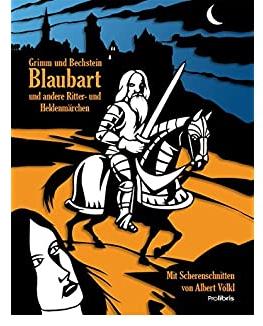 Voll Entsetzen und Todesangst eilte die Frau zu ihrer Schwester, und bat sie, geschwind auf die Turmzinne zu steigen und nach ihren Brüdern zu spähen, und diesen, sobald sie sie erblicke, ein Notzeichen zu geben, während sie sich auf den Boden warf, und zu Gott um ihr Leben flehte. Und dazwischen rief sie: »Schwester! Siehst du noch niemand!« – »Niemand!« klang die trostlose Antwort. – »Weib! komm herunter!« schrie Ritter Blaubart, »deine Frist ist aus!«
Voll Entsetzen und Todesangst eilte die Frau zu ihrer Schwester, und bat sie, geschwind auf die Turmzinne zu steigen und nach ihren Brüdern zu spähen, und diesen, sobald sie sie erblicke, ein Notzeichen zu geben, während sie sich auf den Boden warf, und zu Gott um ihr Leben flehte. Und dazwischen rief sie: »Schwester! Siehst du noch niemand!« – »Niemand!« klang die trostlose Antwort. – »Weib! komm herunter!« schrie Ritter Blaubart, »deine Frist ist aus!«
»Schwester! siehst du niemand?« schrie die Zitternde. »Eine Staubwolke – aber ach, es sind Schafe!« antwortete die Schwester. – »Weib! komm herunter, oder ich hole dich!« schrie Ritter Blaubart.
»Erbarmen! Ich komme ja sogleich! Schwester! siehst du niemand?« – »Zwei Ritter kommen zu Roß daher, sie sahen mein Zeichen, sie reiten wie der Wind.« –
»Weib! Jetzt hole ich dich!« donnerte Blaubarts Stimme, und da kam er die Treppe herauf. Aber die Frau gewann Mut, warf ihre Zimmertüre ins Schloß, und hielt sie fest, und dabei schrie sie samt ihrer Schwester so laut um Hülfe, wie sie beide nur konnten. Indessen eilten die Brüder wie der Blitz herbei, stürmten die Treppe hinauf und kamen eben dazu, wie Ritter Blaubart die Türe sprengte und mit gezücktem Schwert in das Zimmer drang. Ein kurzes Gefecht und Ritter Blaubart lag tot am Boden. Die Frau war erlöst, konnte aber die Folgen ihrer Neugier lange nicht verwinden.
Ludwig Bechstein
(1801 – 1860)
Das Märchen vom Ritter Blaubart
Sämtliche Märchen
• fleursdumal.nl magazine
More in: Archive A-B, Bechstein, Bechstein, Ludwig, Tales of Mystery & Imagination
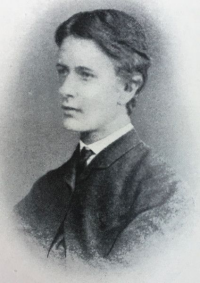
Anacreontic
On the tender myrtle-branches,
In the meadow lotus-grassed,
While the wearied sunlight softly
To the Happy Islands passed,
Reddest lips the reddest vintage
Of the bright Aegean quaffing,
There I saw them lie, the evening
Hazes rippled with their laughing.
Round them boys, with hair as golden
As Queen Cytherea’s own is,
Sang to lyres wreathed with ivy
Of the beautiful Adonis
(Of Adonis the Desired,
He has perished on the mountain,)
While their voices, rising, falling,
As the murmur of a fountain,
Glittered upwards at the mention
Of his beauty unavailing ;
Scattered into rainbowed teardrops
To the at ai of the wailing.
Digby Mackworth Dolben
(1848 – 1867)
Anacreontic
• fleursdumal.nl magazine
More in: Archive C-D, Archive C-D, Digby Mackworth Dolben
The 2020 Virtual Brooklyn Book Festival will be the 15th anniversary of free literary programming!
 This fall an array of national and international literary stars and emerging authors will participate as part of a Virtual Festival including Sigrid Nunez, Lee Child, Salman Rushdie, Mia Couto, Ngũgĩ wa Thiong’o, Joyce Carol Oates, Adrian Tomine, Emily St. John Mandel, Claudia Rankine, Edmund White, Marie Lu, Colson Whitehead, and more.
This fall an array of national and international literary stars and emerging authors will participate as part of a Virtual Festival including Sigrid Nunez, Lee Child, Salman Rushdie, Mia Couto, Ngũgĩ wa Thiong’o, Joyce Carol Oates, Adrian Tomine, Emily St. John Mandel, Claudia Rankine, Edmund White, Marie Lu, Colson Whitehead, and more.
Plus independent publishers, literary magazines, and literary organizations will be showcased in our Virtual Literary Marketplace starting August 15.
Each year the Festival also includes a week of Bookend events — see them virtually this year from locations all over the city. This year we celebrate the 10th anniversary of Bookends!
At Children’s Day, more than 50 authors will participate in a full day of author readings and performances, workshops, activities, and book signings — all virtual.
Some of the children’s authors in 2020 are Max Brallier, Tami Charles, Ben Clanton, Chris Grabenstein, Carlos Hernandez, Oliver Jeffers, Varian Johnson, Meg Medina, and R.L. Stine.
 About the Brooklyn Book Festival: The Brooklyn Book Festival was launched in 2006 to address the need for a major literary event that embraced the diverse constituencies of New York City. The Festival’s mission is to celebrate published literature and support the literary community through programming that connects New York City readers with local, national, and international authors, publishers, and booksellers. To this end the festival develops original programs that are hip, smart, and diverse and collaborates to present free and low-cost programming including the Festival Day, Bookend Events, YA Outloud, and the BKBF Children’s Day. BKBF is presented by the non-profit Brooklyn Book Festival, Inc. and the Brooklyn Book Festival Literary Council.
About the Brooklyn Book Festival: The Brooklyn Book Festival was launched in 2006 to address the need for a major literary event that embraced the diverse constituencies of New York City. The Festival’s mission is to celebrate published literature and support the literary community through programming that connects New York City readers with local, national, and international authors, publishers, and booksellers. To this end the festival develops original programs that are hip, smart, and diverse and collaborates to present free and low-cost programming including the Festival Day, Bookend Events, YA Outloud, and the BKBF Children’s Day. BKBF is presented by the non-profit Brooklyn Book Festival, Inc. and the Brooklyn Book Festival Literary Council.
The Festival is proud of its roster of supporters including the Amazon Literary Partnership, the Baillie Gifford Non Fiction Prize, the Brooklyn Borough President’s Office, Brookfield Properties and J.P. Morgan Chase, Con Edison, Disney, Downtown Brooklyn Partnership, Kirby Family Foundation, Little A, the Mayor’s Office of Media & Entertainment, New York City Department of Cultural Affairs, New York City Council Speaker Corey Johnson and Council Members Brad Lander, Stephen Levin and Carlos Menchaca, NYC COVID-19 Response and Impact Fund in New York Community Trust, New York State Council on the Arts, Lit Tap, NYU. The Festival’s media sponsors include C-SPAN, Book TV, the New York Review of Books, and WNYC.
Be sure to visit www.old.brooklynbookfestival.org or check out the official Facebook page, follow the Festival on Instagram (@bkbookfest), on Twitter (@BKBF), and past Festival photos on Flickr.
2020 Brooklyn Book Festival
Sunday, October 4 = 10am — 8pm
Virtual Festival Day
Saturday, October 3 = 10am — 4pm
Virtual Children’s Day
Saturday, October 3 = 1pm — 6pm
Y.A. Out Loud
September 28 — October 5
Virtual Bookend Events
Confirmed Authors Festival 2020: Salar Abdohbv – Aria Aber – Ayad Akhtar – Becky Albertalli – Rochelle Alers – A. Andrews – Diannely Antigua – Zaina Arafat – Will Arbery – Derf Backderf – Brit Bennett – Carl Bergman – Marie-Helene Bertino – Mark Bibbins – Chelsea Bieker – Betsy Bird – Eula Biss – Max Brallier – Libba Bray – Bill Buford – Susannah Cahalan – Patrice Caldwell – Ada Calhoun – Kacen Callender – Maisy Card – Veronica Chambers – Ruth Chan – Tami Charles – Lee Child – Dave Chisholm – Ben Clanton – Brandy Colbert – Zoraida Córdova – Eduardo C. Corral – Mia Couto – Mike Curato – Angela Dominguez – Sophie Escabasse – Debbi Michiko Florence – Nick Flynn – Curdella Forbes – Carolyn Forché – Gilbert Ford – Kelli Jo Ford – Lauren Francis-Sharma – Marcial Gala – Matt Gallagher – Camryn Garrett – Sasha Geffen – Nelson George – Hafizah Geter – Julia Gfrörer – Paolo Giordano – Chris Grabenstein – Isabel Greenberg – Chris Grine – Kristen Gudsnuk – Romesh Gunesekera – Shawn Harris – Mike Hawthorne – Carlos Hernandez – Amy Herzog – Cathy Park Hong – Mark Honigsbaum – Kiku Hughes – Michael R. Jackson – Victoria James – Oliver Jeffers – N.K. Jemisin – Beverly Jenkins – Kim Johnson – Leah Johnson – Varian Johnson – Tayari Jones – Wayne Jordan – Stephanie Kelton – Jessica Kim – Lily King – Peter Kispert – Yusef Komunyakaa – Andrew Krivak – Ryan La Sala – Stephan Lee – Attica Locke – Marie Lu – Alain Mabanckou – Deborah Madison – Maureen Mahon – Kevin Noble Maillard – Ricardo Alberto Maldonado – Emily St. John Mandel – Ilana Masad – Janae Marks – Bernice L. McFadden – Karen McManus – Juana Medina – Meg Medina – Fernanda Melchor – Colin Meloy – Maaza Mengiste – Kate Messner – Adrienne Miller – Lydia Millet – Jonah Mixon-Webster – Marcus J. Moore – John Murillo – Daniel Nayeri – Emily Nemens – Andrés Neuman – Kevin Nguyen – Lynn Nottage – Sigrid Nunez – Joyce Carol Oates – Tracy O’Neill – Tochi Onyebuchi – Claribel Ortega – Carey Pietsch – Rory Power – Claudia Rankine – Raúl the Third – Calvin Reid – Kiley Reid – Jared Reinmuth – Justin A. Reynolds – Hallie Rubenhold – Salman Rushdie – Kate Elizabeth Russell – Joe Sacco – Aisha Saeed – Jerry Saltz – Maria Scrivan – Tariq Shah – Kevin Sherry – Adania Shibli – Curtis Sittenfeld – Bishakh Som – Mika Song – Leslie Stein – R.L. Stine – Emma Straub – Brandon Taylor – Emily Temple – Ngũgĩ wa Thiong’o – Héctor Tobar -Adrian Tomine – Laura van den Berg – Juan Pablo Villalobos – Ivan Vladislavić – Karolina Waclawiak – Kawai Strong Washburn – Jesse Wegman – Edmund White – Colson Whitehead – Rick Wilson – Alexis Wright – Shannon Wright – Yao Xiao – Bianca Xunise – Gene Luen Yang – Brigit Young – Lidia Yuknavitch – Kate Zambreno –
Brooklyn Book Festival Announces: 15th Anniversary Will Be An All-Virtual Festival
• https://brooklynbookfestival.org/
• fleursdumal.nl magazine
More in: - Book Lovers, - Book News, Art & Literature News, AUDIO, CINEMA, RADIO & TV, Berger, Karl, FICTION & NONFICTION ARCHIVE, LITERARY MAGAZINES, Magazines
Het coronavirus en een nieuw provinciebestuur. Het zijn onzekere tijden in het algemeen en voor ‘Ons Brabant’ in het bijzonder.
 Wat ons te wachten staat kunnen we nog niet overzien, wel is duidelijk dat de crisis op vele vlakken in de samenlevingen grote impact heeft. Corona heeft de culturele sector grotendeels verlamd. Als het nieuwe provinciebestuur van Noord-Brabant haar ambities met ‘Ons Brabant’ op het gebied van cultuur kan realiseren dan zal de verschraling die door corona is ingezet, afgerond worden met het einde van een provinciaal cultuurbeleid.
Wat ons te wachten staat kunnen we nog niet overzien, wel is duidelijk dat de crisis op vele vlakken in de samenlevingen grote impact heeft. Corona heeft de culturele sector grotendeels verlamd. Als het nieuwe provinciebestuur van Noord-Brabant haar ambities met ‘Ons Brabant’ op het gebied van cultuur kan realiseren dan zal de verschraling die door corona is ingezet, afgerond worden met het einde van een provinciaal cultuurbeleid.
Veel Brabantse culturele instellingen zullen hun deur moeten sluiten, het vestigingsklimaat zal verarmen en Brabantse kunstenaars zullen een groot deel van hun opdrachtgevers en podia verliezen en daarmee een zeer onzekere toekomst ingaan.
Om specifiek Brabantse kunstenaars een hart onder de riem te steken in deze moeilijke tijd organiseert PARK de benefiet tentoonstelling BENEFIT FOR BRABANT. Uit meer dan 200 inzendingen is een selectie gemaakt van 138 beeldend kunstenaars die ieder twee werken kunnen tonen. De werken zijn te koop, de opbrengst gaat voor de volle 100% naar de kunstenaar.
In verband met covid-19 vindt er geen officiële opening plaats. We rekenen op uw begrip.
De tentoonstelling is vanaf zaterdag 8 augustus tot en met zondag 30 augustus te bezoeken. PARK is geopend op vrijdag, zaterdag en zondag van 13-17 uur
BENEFIT FOR BRABANT
Kunst in tijden van Corona
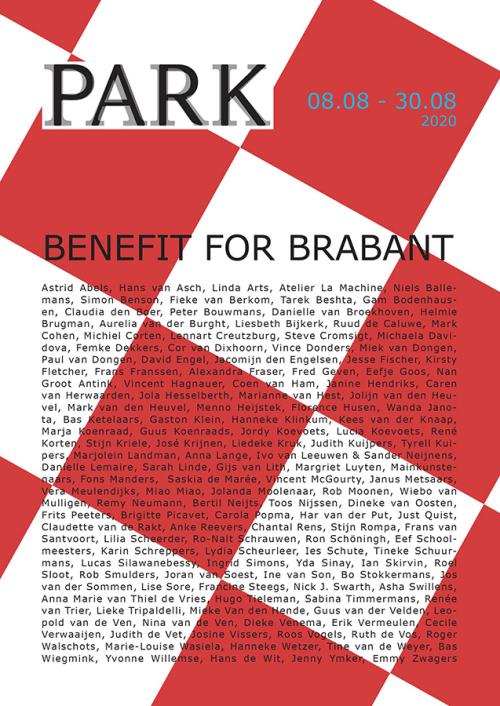
Wilhelminapark 53
5041 ED Tilburg NL
air@park013.nl
www.park013.nl
PARK is een initiatief van
Rob Moonen, Linda Arts, René Korten, Liza Voetman
• fleursdumal.nl magazine
More in: Art & Literature News, Exhibition Archive, Linda Arts, Park
Poetry. California Interest. Chicanx Studies. In his debut short collection, poet Alan Chazaro takes us from the moonlit Bay Bridge to dark Oakland bars to tire shops to backyards to the fireworks and dirt paths of Mexico City.
 Chazaro’s speakers battle to find internal truths in a world defined by external opposition. Here, we glide from Frank Ocean to 80s synthpop, from Half Moon Bay to Athens, from Oscar De La Hoya to Wolverine. This is a collection about navigating multiple worlds, about traversing from boyhood into manhood. In poems that crackle with “scorpions in the dark” and “Lauryn Hill’s voodoo” and “fat / Adidas laces and barbershop fades,” Chazaro explores what it means to curate a sense of self as a millennial first-generation California Chicanx writer. His speakers are driven by a desire to control their identity in a world where they haven’t been able to control much else—as the children of immigrants, as the occupants of ever-shifting spaces, as bodies that belong and don’t belong.
Chazaro’s speakers battle to find internal truths in a world defined by external opposition. Here, we glide from Frank Ocean to 80s synthpop, from Half Moon Bay to Athens, from Oscar De La Hoya to Wolverine. This is a collection about navigating multiple worlds, about traversing from boyhood into manhood. In poems that crackle with “scorpions in the dark” and “Lauryn Hill’s voodoo” and “fat / Adidas laces and barbershop fades,” Chazaro explores what it means to curate a sense of self as a millennial first-generation California Chicanx writer. His speakers are driven by a desire to control their identity in a world where they haven’t been able to control much else—as the children of immigrants, as the occupants of ever-shifting spaces, as bodies that belong and don’t belong.
Structured like a rap mixtape, each poem on the “track list” is an ode to some vibration of memory, sound, or Chazaro’s native Bay Area landscape. THIS IS NOT A FRANK OCEAN COVER ALBUM, just as we are not ever actually ourselves—but a collection of fragments from our component influences and cultures, a reflection of the choices we make in search of a more genuine self.
“I say fuck
because it feels right
about now,
and I say love because
what wrong
could it bring?
I haven’t shot a pistol
since my stepdad
flung his Desert Eagle
from the bedroom and took us
to burst freedom as kids.”
• Winner of the Spring 2018 Black River Chapbook Competition
• Alan Chazaro is the author of THIS IS NOT A FRANK OCEAN COVER ALBUM (Black Lawrence Press, 2019) and PIÑATA THEORY (Black Lawrence Press, 2020). He is currently an adjunct professor at the University of San Francisco, a columnist at Palette Poetry, and is raising money for NBA arena workers during COVID-19.
Alan Chazaro
This Is Not a Frank Ocean Cover Album
2019
Publisher: Black Lawrence Press
ISBN: 978-1-62557-825-9
Poetry
Paperback
Pages:40
Price: $ 9.95
• fleursdumal.nl magazine
More in: #Editors Choice Archiv, - Book News, Archive C-D, Archive C-D
Thank you for reading Fleurs du Mal - magazine for art & literature